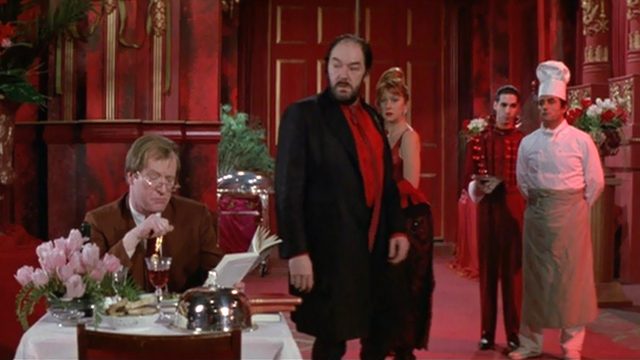Chow Down on Articles About:
- violent history
- TV finale (…or is it?)
- improvising on set
- indie sleaze
- smiling and dancing in the face of disaster!
Thanks to wallflower, C.M. Crockford, Ruck Cohlchez, and Miller for serving up this week’s dishes. Send articles throughout the next week to ploughmanplods [at] gmail, post articles from the past week below for discussion, and Have a Happy Friday!
A banger of a piece in Public Parking by our own C.M. Crockford on the history of Michael Nyman’s Memorial music through its use in The Cook, The Thief, His Wife, & Her Lover and the traces of history and violence it contains:
A satire of the free-market capitalism overtaking England at the time, as well as (literal) consumerism, The Cook avoids becoming a stilted parable thanks to the humanity of characters like Georgina, chef Richard, and the poor kitchen boy Pip. Even Albert’s inability to introspect, and his resentment of Michael’s literacy, would be pitiful if he weren’t so loathsome. Over the course of the film, Albert’s henchmen abandon him one by one, disgusted by the degradation and abuse offered to anyone in his vicinity. However, Albert is also a crime boss, and the characters put up with his cruelty until each one reaches a breaking point. The obnoxious thief speechifies about his taste – though he hates most of the food in the restaurant – but where Albert believes his capital liquidity inherently makes him a man of class, knowledge, and refinement, what he really possesses is access. He owns the restaurant, and he pays his henchmen to intimidate and murder. Therefore he can throw diners out, mispronounce every word on the menu, and careen into the back of the place whenever he likes. His crucial mistake is assuming he also owns people, including Georgina.
In Deadline, Nellie Andreeva talks to Bill Lawrence about Bad Monkey‘s first(?) season, adapting the popular Carl Hiaasen novel, and working with Vince Vaughn:
LAWRENCE: Vince’s skill-set is, there’s three different things that Vince does that make him awesome. One is, every time he does the scene, he’s so respectful. He says, alright, let’s do one exactly as written. So we do that. And then he’ll say, alright, everybody, let’s do one that we play. And then we play, and we’ll steal jokes of his. And the third thing is, he also has this innate ability to make everything look like it’s coming off the top of his head. And not only is he riffing and improvising, but also he is doing the same thing when he’s setting up other actors and actresses and making them funny. On this show, it definitely had that vibe. Meredith Hagner from Search Party, who plays Eve, is a remarkable improv comedian and was doing it all the time. Alex Moffat, SNL, doing it all the time. I always populate my worlds with people like that, and then take credit for it.
The Guardian‘s Chris Broughton interviews the director and castmate of Rutger Hauer on how he approached his role in The Hitcher:
[C Thomas Howell:] Rutger seemed to terrify everyone on the production and was pretty much left alone. I think he enjoyed the power he had over people. About three weeks in, he said: “I think we should have lunch together.” I went to his trailer and we sat in dead silence as he chain-smoked filterless Camel cigarettes. After an eternity, I mustered up some courage and in my squeaky teenage voice said: “Rutger, what’s your secret to playing bad guys?” He took a long drag of his cigarette, leaned into my face, slowly exhaled and whispered: “I don’t play bad guys.” I just gathered up my things, thanked him for lunch and backed out of the trailer.
At GQ, Meaghan Garvey analyzes the alleged resurgence of alleged indie sleaze:
Why is it that this seemingly passing trend, of the sort frequently astro-turfed by creative strategists to hold culture writers hostage for 5-7 business days, has lasted now three years? The most convincing evidence of the trend’s relevance comes from the steady drip of thinkpieces from writerly millennials assuring Gen Z readers that indie sleaze isn’t real/can’t hurt you, like they’d been paid a startling visit by @TheGhostOfChristmasPast. Of course, they’re mostly speaking to themselves, having experienced for the first time their youth culture repackaged for a generation whose standing in target market demographics has finally eclipsed their own. You might condense the essence of the indie sleaze revival as millennial mid-life crisis meets algorithmic psyop meets the slow cancellation of the future, wherein the recent past is sold to us as something new.
For The Guardian, Thomas Hobbs talks to the surviving members of Gang of Four 45 years after the release of Entertainment!:
Speaking over video call, [singer Jon King] holds up a council pamphlet handed out across the Leeds University campus in the late 1970s, which bleakly advises people what to do in the event of the Soviet Union dropping a one-megaton bomb on the city. It even warns that “at least” 100,000 locals will likely perish. As he explains, it was also a time when the notorious serial killer Peter Sutcliffe, dubbed The Yorkshire Ripper, was at large in the region; he was convicted in 1981 of murdering 13 women (including a Leeds University student, Jacqueline Hill) and attempting to kill seven more. “We had female student friends who literally carried iron bars in their handbags for protection,” King says. “All of this tension was being absorbed into our sound. Entertainment! is a record about young people smiling and dancing in the face of disaster.”


